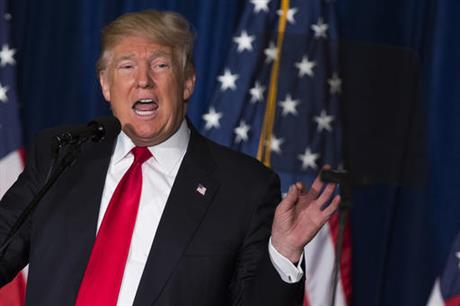
By JILL COLVIN and JULIE PACE
In a rare formal policy speech, Republican front-runner Donald Trump vowed Wednesday to put American security “above all else” if elected president, warning allies they would be left to defend themselves if they don’t “pay their fair share.” He also called for an easing of tensions with Russia “from a position of strength, only.”
“‘America first’ will be the major and overriding theme of my administration,” Trump said in a 38-minute address at a Washington hotel.
Trump — fresh off a sweep of five Northeastern primaries that pushed him closer to the GOP nomination — sought to expand on foreign policy views that have lacked detail and worried experts in both parties. Still, he left major questions about his proposals unanswered, including his plan for defeating the Islamic State group, casting his sparse details as a strategy for catching America’s enemies off guard.
“We must, as a nation, be more unpredictable,” Trump said. The businessman read his remarks off a teleprompter, a notable change for a candidate who typically speaks off the cuff and has mocked his rivals for giving prepared speeches.
Sponsored Links
How a CRM Helps Your Business Grow [eBook]
Salesforce
See Your Businesses Biggest Cyber Pressure Point — Take the Test
Travelers
Trump appeared to send a mixed message to America’s allies. He doubled down on his previous assertion that other countries must contribute to international security agreements, such as NATO, if they’re to get the benefits of American military protection. Yet he also assured allies that the U.S. will have a renewed commitment to its overseas friends if he’s elected president.
“To our friends and allies, I say America is going to be strong again, America is going to be reliable again,” Trump said. “It’s going to be a great and reliable ally again.”
He called for a summit with NATO allies and Asian partners shortly after taking office. And he made direct appeals to Russia and China, saying the U.S. and those world powers are “not bound to be adversaries.”
“We should seek common ground based on mutual interests,” Trump said, citing Russia’s own concerns about the rise of Islamic extremists.
Many elements of Trump’s speech were similar to his typical campaign remarks, but he delivered them in a much more sober, restrained manner. Critics have said repeatedly that he has not shown an ability to act and sound “presidential.”
At least initially, Trump’s speech did not appear to change his critics’ view of his preparedness for being commander in chief. South Carolina’s Republican Sen. Lindsey Graham said on Twitter that the businessman’s speech was “pathetic in terms of understanding the role America plays in the world.”
Trump spent much of his speech panning President Barack Obama’s handling of crises in the Middle East, saying the current administration was leaving a legacy of “weakness, confusion and disarray.”
“We’ve made the Middle East more unstable and chaotic than ever before,” Trump said. He singled out Democratic front-runner Hillary Clinton’s handling of the deadly attacks on a U.S. compound in Benghazi, Libya, and repeatedly linked the former secretary of state to what he sees as the failures of the Obama administration to show strength around the world.
Even before Trump’s address, Clinton’s campaign blasted out a news release saying the Republican leader has used “the most reckless rhetoric of any major presidential candidate in modern history.”
Still, Trump didn’t spare former Republican President George W. Bush, criticizing his efforts to bring democracy to the Middle East and reaffirming his own opposition to the unpopular Iraq war. Drawing a contrast with hawkish Republicans, Trump said “war and aggression will not be my first instinct” and pledged to deploy combat forces only as a last resort.
Trump spoke to an invited audience of conservative-leaning national security experts, as well as some prominent foreign policy writers.
Trump’s advisers cast Wednesday’s speech as the first in a series of policy addresses aimed at calming the nerves of Americans who worry the businessman doesn’t have the experience to handle the range of responsibilities that land on a president’s desk. A speech on trade is expected soon.
_



